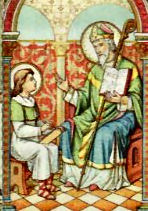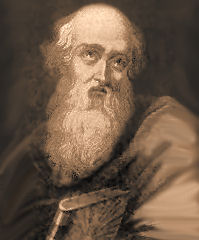Lent: February 23rd
Optional Memorial of St. Polycarp of Smyrna, bishop and martyr
Old Calendar: St. Peter Damian, bishop and doctor
St. Polycarp of Smyrna, was converted to Christianity by St. John the Evangelist. He was a disciple of the apostles and friend of St. Ignatius of Antioch. He was ordained bishop of Smyrna (now Izmir, Turkey) and was about eighty-six when the Roman pro-consul urged him to renounce Christ and save his life. St. Polycarp said, "For eighty-six years I have served Him and he has never wronged me. How can I renounce the King who has saved me?" He suffered martyrdom in 155 by burning at the stake in the amphitheater of Smyrna.
According to the 1962 Missal of St. John XXIII the Extraordinary Form of the Roman Rite, today is the feast of St. Peter Damian. His feast in the Ordinary Form of the Roman Rite is celebrated on February 21. St. Polycarp's feast is observed on January 26.
St. Polycarp of Smyrna Polycarp had known those who had known Jesus, and was a disciple of St. John the Apostle, who had converted him around the year 80 AD. He taught, says his own pupil Irenaeus of Lyons, the things that he learned from the Apostles, which the Church hands down, which are true. Irenaeus, who as a young boy knew Polycarp, praised his gravity, holiness, and majesty of countenance. He had lived near Jerusalem and was proud of his early associations with the Apostles.
Polycarp had known those who had known Jesus, and was a disciple of St. John the Apostle, who had converted him around the year 80 AD. He taught, says his own pupil Irenaeus of Lyons, the things that he learned from the Apostles, which the Church hands down, which are true. Irenaeus, who as a young boy knew Polycarp, praised his gravity, holiness, and majesty of countenance. He had lived near Jerusalem and was proud of his early associations with the Apostles.
Polycarp became bishop of Smyrna and held the see for about 70 years. He was a staunch defender of orthodoxy and an energetic opponent of heresy, especially Marcionism and Valentinianism (the most influential of the Gnostic sects). Toward the end of his life he visited Pope St. Anicetus in Rome and, when they could not agree on a date for Easter, decided each would observe his own date. To testify his respect and ensure that the bonds of charity were unbroken, Anicetus invited Polycarp to celebrate the Eucharist in the papal chapel on this occasion. Polycarp suffered martyrdom with 12 others of his flock around the year 156.
—Excerpted from St. Polycarp, Bishop and Martyr by Fr. Paul Haffner (Inside the Vatican, February 2004)
Among the select few from apostolic times about whom we have some historical information is Polycarp, bishop of Smyrna and one of the most glorious martyrs of Christian antiquity. His life and death are attested by the authentic "Acts" of his martyrdom (no similar account is older), as well as by other contemporary writings. It moves us deeply when, for example, we find in St. Irenaeus, a disciple of Polycarp, the passage in which he reminisces:
"The memory of that time when as a youth I was with Polycarp in Asia Minor is as fresh in my mind as the present. Even now I could point to the place where he sat and taught, and describe his coming and going, his every action, his outward appearance, and his manner of discourse to the people. It seems as though I still heard him tell of his association with the apostle John and with others who saw the Lord, and as though he were still relating to me their words and what he heard from them about the Lord and His miracles. . . ."
On the day of his death (February 23) the Martyrology recounts with deep reverence:
"At Smyrna, the death of St. Polycarp. He was a disciple of the holy apostle John, who consecrated him bishop of that city; and there he acted as the primate of all Asia Minor. Later, under Marcus Antoninus and Lucius Aurelius Commodus, he was brought before the tribunal of the proconsul; and when all the people in the amphitheater cried out against him, he was handed over to be burned to death. But since the fire caused him no harm, he was put to death by the sword. Thus he gained the crown of martyrdom. With him, twelve other Christians, who came from Philadelphia, met death by martyrdom in the same city."
Excerpted from The Church's Year of Grace, Pius Parsch.
Patron: Against ear ache, dysentery.
Things to Do:
- Read the Golden Legend account of the life of St. Polycarp and this life of St. Polycarp from The Early Church Fathers website. Read an account of his martyrdom.
- Read St. Polycarp's Epistle to the Philippians.

The Station today is at St. Balbina's, virgin and martyr (130), the daughter of the tribune and martyr, St. Quirinus. The church is ancient, and was probably built in the 4th century above the house of the consul Lucius Fabius Cilone. The first reference to it is found in a 6th century document, where it is referred to as Sanctae Balbinae. It was consecrated by Pope St. Gregory the Great.
